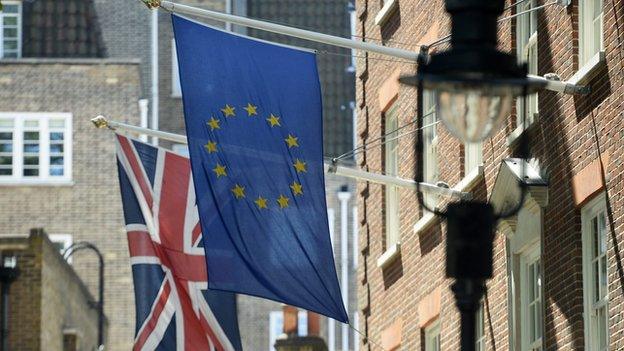EU referendum: Does the wording of the question matter?
- Published
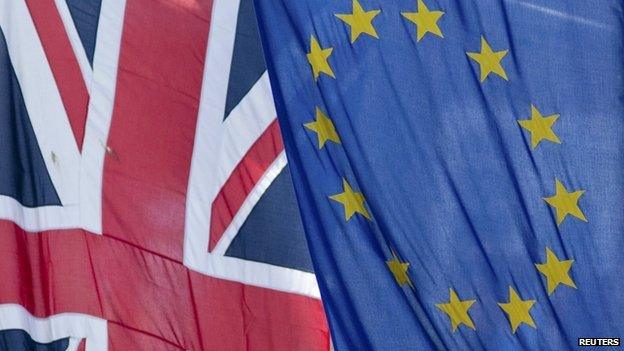
"Should the UK remain a member of the EU?"
David Cameron is thought to favour a question along these lines for the referendum on the UK's European Union membership.
The prime minister is said to believe this would allow those who want Britain to remain in the EU to style themselves as the Yes campaign.
"It is the Bob the Builder philosophy," says Matt Qvortrup, professor of applied political science at Coventry University.
"It is the 'Yes we can' mood that was used by Obama. It is an attempt to be the positive campaign because nobody likes to be seen as negative."
Maybe the government has learnt lessons from last year's Scottish independence referendum, where the Yes campaign was widely acknowledged to be the more positive one.
"It was all about taking a chance, let's do this. It was about hope and possibility," Prof Qvortrup says.
Former SNP leader Alex Salmond, who led the Scottish independence campaign, told BBC Newsnight last week: "You certainly should not fool about with the question. It should be straightforward and honest. But the Yes side is important.
"If you want to embrace a positive vision of staying in Europe you want to be Yes."
In 1975 when Labour Prime Minister Harold Wilson held the last referendum on the UK in Europe, one of his slogans was 'Say No to the No men'.
Prof Qvortrup says Wilson ran his campaign as a vote for Yes and characterised No voters as grumpy naysayers like Tony Benn and Enoch Powell.
Maybe UKIP leader Nigel Farage will be able to persuade people that his campaign to leave the EU is about a new dawn and a fresh start for the UK, but he will be fighting against the negative implications of a No campaign.
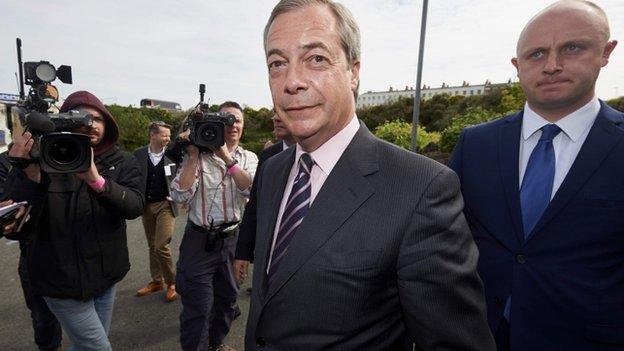
Nigel Farage will be a leading figure in the No campaign
In the run-up to last year's Scottish independence referendum both sides agreed that the Electoral Commission should scrutinise the SNP government's preferred "yes/no" question: "Do you agree that Scotland should be an independent country?"
The elections watchdog tweaked those words and reported that the question should be: "Should Scotland be an independent country?"
The commission said the question must be presented clearly, simply and neutrally.
The Scottish government agreed to changing the question when the commission reported its findings.
The question thought to be favoured by Mr Cameron does not use the word "agree", which is very common in referendums worldwide, according to Prof Qvortrup.
The possible wording is very similar to that used by Mr Wilson in 1975, which was: "Do you think the UK should stay in the European Community (Common Market)?"
Prof Qvortrup says one advantage of asking: "Should the UK remain a member of the EU?" is that the question is short.
Voters tend to become more sceptical about a proposition if the question is too long, they suspect they are "having the wool pulled over their eyes", he says.
According to Prof Qvortrup, there is one lesson the prime minister can learn from Mr Wilson's 1975 campaign that would have a far greater impact on the result than the question.
"If you have a referendum soon after the election it favours the government," he says.
Mr Wilson was elected with a slim majority in October 1974 and held the referendum just eight months later in June 1975.
Dr Qvortrup says the prime minister was still enjoying the "honeymoon" effect. Tony Blair was even quicker with his referendum on Scottish devolution after his 1997 election victory.
"If you leave it too late you start annoying people and it becomes a referendum on you rather than on the issue," he says.
When referendums are held more than two years after a government takes power they lose in about 90% of cases, the professor says.
Lib Dem leader Nick Clegg experienced this in 2011 with alternative vote referendum.
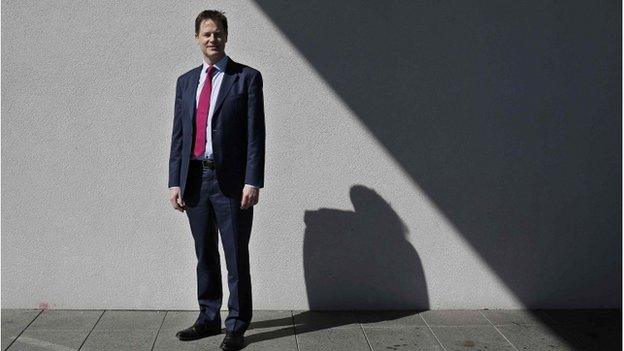
Nick Clegg lost the referendum on AV in 2011
Although only a year after he had joined the coalition government, he had already managed to alienate a large section of the electorate by breaking his pledge on tuition fees. The referendum became largely about the Lib Dem leader and he lost the vote.
A quick referendum can give you as much as 10% swing in your favour, Prof Qvortrup says, whereas the question itself will not sway people by more than 2% or 3%.
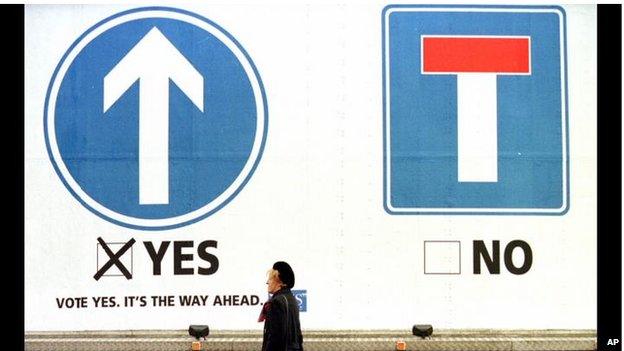
An advertisement from the 1998 Northern Ireland referendum
One of the professor's favourite referendum questions is the one used on accepting the Good Friday Agreement in Northern Ireland in 1998 because it illustrates how little the question matters if people are already familiar with the issue.
Voters were asked: "Do you support the Agreement reached at the multi-party talks on Northern Ireland and set out in Command Paper 3883?"
Prof Qvortrup says: "The interesting thing about the command paper question in Northern Ireland is that it was taken for granted that people knew what it was all about.
"There was that long campaign and Bono was on stage with David Trimble and John Hume.
"There was all that shenanigans leading up to that referendum on the Good Friday agreement in 1998, and all that energy and all that focus from the media meant you could have just had the words 'yes' or 'no' on the ballot, because people knew perfectly well what it was all about.
"They were probably able to cite chapter and verse from the agreement."
For Prof Qvortrup, this is the most important point.
He says the question is not vitally important because people will know before they enter the polling place what their views are on Europe.
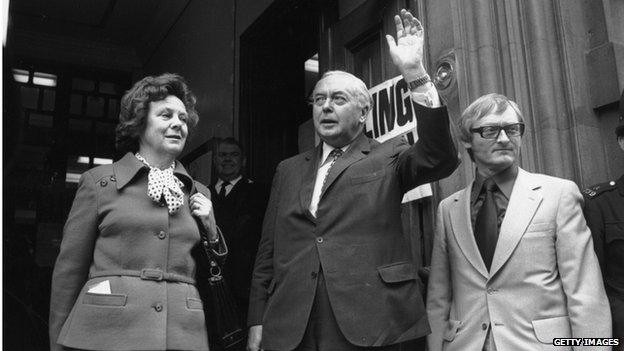
Prime Minister Harold Wilson casting his vote for the referendum on the Common Market in 1975
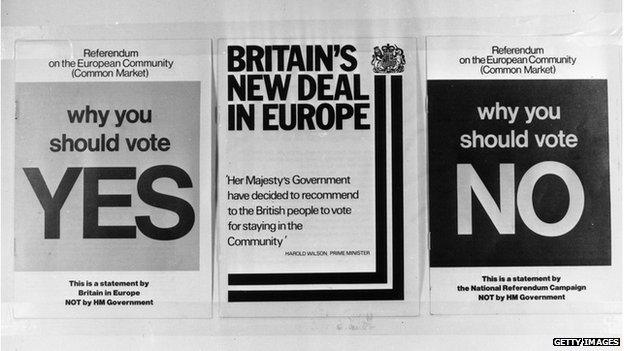
Three documents, for and against, published for the referendum on the Common Market in 1975
He says: "The overall conclusion one can draw if one looks around the world is that question itself extremely rarely has an impact on the outcome of the referendum."
The UK has historically held very few referendums and those have tended to have long campaigns, giving people plenty of opportunity to make up their minds.
However, in countries such as Switzerland, as well as in many American states, they often hold several referendums on the same day and people may be voting without seeing the question in advance.
"But if you look at countries where there is one referendum, say, every few years, there's been a long run on to the referendum where the issue has been debated at considerable length, then people would have made up their minds before going into the polling booth and words of the questions is then of relatively minor importance," says Prof Qvortrup.
- Published27 May 2015
